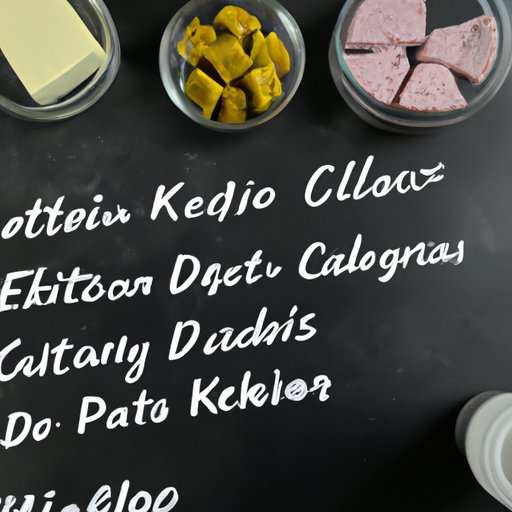Introduction
The keto diet is one of the most popular diets around today. It’s a high-fat, low-carb diet that has been used to help people lose weight, improve their health, and manage certain conditions like epilepsy. But, what exactly can you eat on a ketogenic diet? This article will provide an overview of the keto diet and its benefits, a comprehensive grocery list of keto-friendly foods, macronutrient breakdowns for your meals, meal plans for breakfast, lunch, dinner, and snacks, and expert advice from nutritionists on maintaining the keto diet.

Overview of the Keto Diet
The ketogenic diet, or “keto” for short, is a high-fat, low-carb diet that was developed in the 1920s to treat epilepsy. When followed correctly, it puts your body into a state of “ketosis” where it begins to burn fat for energy instead of glucose. By following a keto diet, you can reduce your carb intake and replace it with healthy fats and proteins, which can help you lose weight and improve your overall health.

Benefits of the Keto Diet
The keto diet has been shown to have numerous health benefits. Studies have found that it can help you lose weight, reduce inflammation, lower cholesterol levels, and even improve cognitive function. Additionally, research has shown that following a keto diet may help reduce risk factors for heart disease, diabetes, and other chronic illnesses. According to a study published in the British Journal of Nutrition, “The ketogenic diet has potential to significantly improve cardiometabolic risk factors, including body weight, glycaemic control, blood pressure, lipid profile and inflammatory markers.”
Grocery List of Keto-Friendly Foods
When shopping for groceries on a keto diet, it’s important to focus on whole, unprocessed foods that are high in healthy fats and proteins and low in carbohydrates. Here’s a list of some of the best keto-friendly foods to include in your diet:
Fats
- Avocados
- Extra Virgin Olive Oil
- Coconut Oil
- Butter
- Nuts and Seeds
Proteins
- Eggs
- Fish and Seafood
- Organic Meats
- Tofu
Carbohydrates
- Leafy Greens
- Non-Starchy Vegetables
- Berries
Macronutrients to Focus on in a Keto Diet
When following a keto diet, it’s important to pay attention to your macronutrient intake. Macronutrients are the three major nutrients that provide energy to our bodies: carbohydrates, proteins, and fats. On a keto diet, you should aim to get approximately 70-80% of your calories from fat, 20-25% from protein, and 5-10% from carbohydrates.
Fat
Fat is the primary macronutrient on a keto diet and should make up the majority of your calories. Healthy sources of fat include avocados, olive oil, coconut oil, butter, and nuts and seeds.
Protein
Protein should make up about 20-25% of your total calorie intake on a keto diet. Good sources of protein include eggs, fish and seafood, organic meats, and tofu.
Carbohydrates
Carbohydrates should be kept to a minimum on a keto diet. Aim to get about 5-10% of your total calorie intake from carbohydrates. Good sources of carbohydrates include leafy greens, non-starchy vegetables, and berries.
Meal Plans for Breakfast, Lunch, Dinner, and Snacks
Once you’ve got your grocery list together, it’s time to start planning your meals. Here are some meal plans for breakfast, lunch, dinner, and snacks that you can use to get started on your keto diet.
Breakfast
- Scrambled eggs with spinach and feta cheese
- Avocado toast with smoked salmon
- Greek yogurt parfait with berries and nuts
Lunch
- Grilled chicken salad with olive oil dressing
- Tuna salad wrap with cucumbers and tomatoes
- Roasted salmon with roasted vegetables
Dinner
- Grilled steak with cauliflower mash
- Baked salmon with roasted Brussels sprouts
- Vegetable stir-fry with tofu
Snacks
- Almonds and walnuts
- Cheese and olives
- Hard-boiled eggs
- Celery sticks with nut butter

Interview Experts on the Keto Diet
To get some expert advice on following a keto diet, we spoke with registered dietitian Jennifer McDaniel. Here are her top tips and advice for maintaining a successful keto diet:
“My biggest tip for following a successful keto diet is to plan ahead. Meal prepping is key to staying on track and making sure you’re getting the right balance of macronutrients. Additionally, it’s important to stay hydrated and get enough sleep to ensure your body is functioning optimally. Finally, don’t forget to listen to your body and give yourself permission to enjoy treats in moderation.”
Conclusion
The keto diet is an effective way to lose weight, improve your health, and manage certain conditions. By focusing on whole, unprocessed foods that are high in fat and low in carbs, you can achieve your health and fitness goals. With the right meal plans, grocery lists, and expert advice, you can successfully follow a keto diet and reap all of its amazing benefits.
(Note: Is this article not meeting your expectations? Do you have knowledge or insights to share? Unlock new opportunities and expand your reach by joining our authors team. Click Registration to join us and share your expertise with our readers.)
